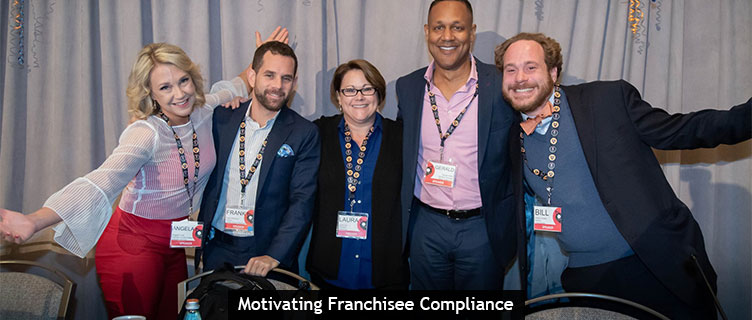Motivating Franchisee Compliance

It’s never too early for an emerging franchisor to start thinking about franchisee compliance. Lauren Coe, CEO and owner of Snapology, remembers all too well being at her first Springboard and brushing off calls from other, more experienced franchisors to prepare for dealing with uncooperative franchisees. Coe admits regret at not having taken the message more seriously several years ago. “I sat here like you,” she said to fellow franchisors and other guests. “I 100 percent got the same advice [about encouraging franchisee compliance], and I 100 percent ignored it.”But how can emerging franchisors encourage franchisee compliance? Fisher Zucker partner Bill Graefe suggests that his clients think of enforcing compliance using a carrot and a stick—by enticing franchisee compliance through various incentives (carrots) and, when necessary, through more draconian measures (sticks). Graefe acknowledges that identifying the point at which the franchisor should switchfrom carrots to sticks—the “breaking point”—isn’t always easy, which is why franchisors can save themselves headaches down the road by contacting legal counsel as soon as a dispute arises.
Experienced franchisors activate their “franchisee radars” at the beginning of the screening process; they are always looking for signs a prospect might be difficult to work with, and vice-versa. Angela Cote of Cultivate Advisors admits that emerging franchisors often fail to ask the right questions during the courting stage. “A franchisor might complain that a particular franchisee is not engaged enough in the community surrounding its franchised business. What the franchisor realizes all too late is that it could have avoided the frustration by digging deeper—asking questions about community involvement, etc.—during the screening process.”
Gerry Wells, General Counsel and Chief Compliance Officer of Rita’s Italian Ice, adds that another way to get ahead of compliance issues is to get functional manuals in place early on in the life of the franchise. Manuals help establish franchisee expectations, especially for those who do not read their legal documents closely.Wells also warned that the franchise agreement and manuals should work in concert, particularly where the terms and conditions of the former refer to the latter: “If your franchise agreement and manual don’t work in concert, your franchise agreement is a piece of Swiss cheese,” says Wells, who recommends that manuals be professionally compiled, if possible. But Laura Coe says if you represent an emerging franchisor, you can save cashby compiling your operations manual on your own—then having a lawyer or other professional review it. Of utmost importance is that the franchisor have a functional manual in place.
Frank Robinson, a partner at the Canadian law firm Cassels Brock, counsels his clients to appeal to the psychologies of their franchisees when trying to encourage compliance. Sometimes sticks, like administrative fees, can prove administratively difficult to enforce and counterproductive. The system will be healthier if the franchisor can get franchisees to buy in rather than see compliance as a cost of doing business.
Early in the life of the franchise, the franchisor should develop a strategy for resolving disputes with its franchisees prudently, fairly, and decisively. In rare cases, the recalcitrant franchisee behaves so egregiously that the franchisor must act swiftly to terminate the franchise agreement. But under less certain circumstances, says Robinson, “Things need to bend before they can break.” Angela Cote agrees: “The franchisor needs to flex its muscles, but it must resist the temptation to flex too early.” The franchisor should try to salvage the relationship if it can do so without detriment to the brand. After all, franchisee happiness and success are critical to the overall wellbeing of the system.
Back



